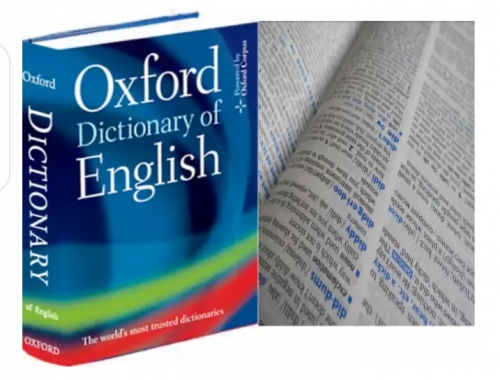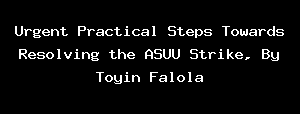profile/399Dlj1_hhWsAAkhLH.jpg
Xander

Nigerian Who Sued University Of Oxford For Wrongful Definition Of Words Gets Favorable Court Ruling
~1.4 mins read
Things that laymen overlook the lawyers take seriously. A Nigerian lawyer, Ogedi Ogu has filed a N10 Million suit before Justice I .O . Harrison Lagos State High Court against the University of Oxford, England for alleged wrongful definitions of the words “mortgagee’’ and “mortgagor†in the Oxford Dictionary, published by Oxford University Press.
Ogu claimed that Oxford Dictionary wrongly defined the word “mortgagee’’ as the borrower in a mortgage transaction; and “mortgagor ’’ as the lender which according to him was contrary to the definition of “ mortgagee†as lender and “mortgagor †as borrower in many other dictionaries. He equally claimed in the suit that he had relied on the wrong definition to offer legal advice to his professional colleague. It should be noted that the claimant, Mr Ogedi Ogu had sued both the University of Oxford and Oxford University Press as 1st and 2nd defendants respectively.
When the matter was slated on 23 June 2020, for ruling on preliminary objection brought by the Oxford University, the counsel to the defendants, Mrs Funke Adekoya ( SAN ), who filed the preliminary objection on the ground that the claimant did not comply with Section 97 of the Sheriff and Civil Process Act in issuing and serving his writ of summons, also contended that Oxford University Press, being only a department under the University of Oxford was a non -juristic entity, and thus could not be sued. She thus urged the court to dismiss the suit for being incompetent.
The judge ruled in favor of the defendants only to the effect that Oxford University Press was not a juristic entity and thus struck out Oxford University Press from the suit but the court ruled that "the writ was validly issued and service was lawful and regular" and thus ordered that the matter should proceed to trial. Ogu is asking for N10 million damages .
So the English people make mistakes too in English language?
Source: Nation
profile/399Dlj1_hhWsAAkhLH.jpg
Xander

Urgent Practical Steps Towards Resolving The ASUU Strike, By Toyin Falola
~7.0 mins read
The Academic Staff Union of Universities (ASUU) strike has become similar to the story of an unfortunate motherless baby in an enemy’s territory. Even a better metaphor is that of rape — the Federal Government is raping ASUU; ASUU is raping the students; and both the government and ASUU are raping the parents. If the word “rape†turns your stomach, replace it with the phrase “short changeâ€! As a result, the society bleeds, and there is anger everywhere — the teachers are outraged, the parents are livid, and members of the public are apoplectic. I don’t know about the officials.
The time for the blame game should be over. The outcome has been an unmitigated tragedy, such that a nation that is struggling to attain productivity and competitiveness will release its youth to the streets for experimental prostitution and drug trafficking. Either both reach negotiated compromises, or one side gives more than the other. The rape must end. The problem is that it is challenging to commit a government to keep the commitment made by a previous one. Thus, a template arrived at by civil servants in the Ministry of Education, not negotiated by politicians, must be the way to go.
On the part of ASUU, the demands and strikes have become repetitive, to the point of saturation and fatigue. The behaviour of the government is equally repetitive — agree to some conditions in one year and after that renege on them in the succeeding year. Or how else could one explain that ASUU has been making the same demands from every successive government in Nigeria for over two decades? The same ASUU members are aware that the members of the public are not always carried along. Yet, they’ve seen no alternative from the strikes or rethinking the strategy to a different approach that will reduce the burdens on the students and their parents.
The objectives of the strike are not all about personal gains but the overall improvement of the education system. If democracy is working well, it is the representatives of states and local governments who should be doing what ASUU is doing, seeking and approving funding for schools located in their constituencies, championing the cause of good education, promoting higher education, and encouraging first-rate research. No, the politicians are more concerned with egunje, i.e., the spoils of being in power! What is the purpose of a democracy where the politicians cannot fight for the public good?
Both the government and ASUU must reach a set of agreements to terminate the strike. I am not sure that ASUU can ever win the argument that the government and politicians should stop establishing new universities. They won’t listen because, to the typical Nigerian politician, anything that shows some kind of building is evidence of a success story since they cannot see something tangible or anything of substance in the cognitive development of students or the growth of their intellect, or, as they might ask, how is anyone going to appreciate the enhancement of the human brain? Spending money on what is on the ground is not to them an achievement but a consolidation of the success of their predecessors, plus an opportunity to explain where all the disappearing public monies are going. Federal and state governments have changed the names of many universities to honour their godfathers. Maybe we can offer them all the streets at the University of Ibadan to appease them to do what is right. ASUU can fight less on the idea of the Visitation Panels and agree to a certain number per year. The “revitalisation fund†can be distributed over time, as well as the Earned Academic Allowances.
To those unfamiliar with what I am saying, they are all about agreements dating back to 2009, with a further conversation that led to the 2019 Memorandum of Action. Thus, to people opposed to ASUU, they should know that the Union is fighting over agreements that the government has acceded to and signed to uphold. What became added to it was the Integrated Payroll and Personnel Information System (IPPIS), which ASUU had rejected as far back as 2013.
Today, many of the issues that led to the indefinite strike declared on March 17th have become marginalised by those around the IPPIS, which means that some problems can be isolated and agreed upon so that the schools can open. To this end, I have the following practical recommendations:
1. There must be a renewed commitment to a realisable set of agreements tied to values and funding. Perhaps, there must be a three-year plan of action where all transactions are reviewed and readjusted according to prevailing circumstances and the state of the country’s economy;
2. There must be a mandatory annual meeting between ASUU and the government to discuss possible areas of disagreements and meet some urgent demands without closing schools. There must also be a rigorous performance test that ASUU must provide verifiable results to all the stakeholders. One cannot fight for autonomy and does not provide evidence of performance. Autonomy should not be about creating an island of privileges without responsibilities;
3. The issue of IPPIS must be resolved before this strike can be called off, or else, the whole months out of school, outside of the COVID-19 effect, would amount to a waste. Now, this is not something that would be peculiar to this current strike action taken by the Union. The difference would only be that this time, the cost would be too high on the institutions, especially in the area of autonomy and performance. To ASUU, the IPPIS can turn universities into the civil service.
Therefore, while it is important to note that the resumption of ASUU is long overdue, the issue of IPPIS must be resolved speedily for this to take place. Fortunately, the Union has provided an alternative to this platform to the government, and we can only hope that reason will prevail in the matter as soon as possible. I suggest that the option can be tried and areas of agreement reached. The government should recognise areas of peculiarities to the Universities, while ASUU must not be seen as lending its weight behind corrupt practices on campus. Autonomy is to enhance performance, not to hide misconduct.
4. Since the government has agreed to try the alternative platform created by ASUU — the University Transparency and Accountability Solution (UTAS), there should be an agreement to call off the strike pending the determination of the integrity test. Both parties have allocated 18 months to the trials and tests. Meanwhile, both parties can agree to suspend IPPIS for the time-being and meet several times in the next 18 months to compare notes and review progress. ASUU has sold UTAS as an efficient, home-grown software that meets the demands of the Federal Government.
…ASUU also has a role to play in letting the students and the public know that their battles are for us all. Often, the perception held by the students and members of the public is that ASUU strikes have always been about the pockets of its members.
5. To make my second recommendation an empirical reality, and as a long shot, there could be an arbitrating, totally independent body to monitor activities between ASUU and the Federal Government. This body, which might be equally funded by both parties, should constitute the channel of communication between the two. It should be charged with the oversight of ensuring that agreements between both parties are kept and not violated by either of the parties;
6. Also, the Federal Government and ASUU should, as a matter of utmost necessity, embrace transparency in all their future dealings. This is quite important as both parties have, in recent times, accused the one another of insincerity in their dealings and the information they release to the public. This need for transparency should be accompanied by the selfless desire to resolve all ongoing issues. A display of openness and sincerity leaves no room for suspicion and ultimately would ease the path of negotiations and ensure there is absolute trust and confidence;
7. Towards preventing future recurrence and ensuring the sustainability of educational stability, the Federal Government should start working towards implementing the UN’s recommendation of 26 per cent of the national budget on education. Notably, if this has been the case since 1999, the perennial crises in the educational sector would never have existed, and the development of the sector would have been significant, emulating those of other developed countries. The Federal Government can throw the olive branch with a commitment to increase the budget committed to education — a 12-15 per cent of the national budget would reassure ASUU that the problem of funding in the educational sector would soon become a thing of the past.
8. Sequel to (7), ASUU also has a role to play in letting the students and the public know that their battles are for us all. Often, the perception held by the students and members of the public is that ASUU strikes have always been about the pockets of its members. Put differently, it is a trendy belief amongst students that whenever ASUU gets funding from the government, the visible outcome is the purchase of new cars and not the improvement to the quality of teaching and research.
We indeed have a stroke! Before we move to a stage of fatal apoplexy, we must hurry to find a cure. The first medication — for this self-inflicted and lifestyle disease — is to negotiate with all the available instruments, persuasions, and skills to return our students — the victims of our arrested development — back to school. The second medication must be preventive —to ensure that campuses remain open, twelve months a year, building for us a knowledge economy that will develop our post-oil economy.
Toyin Falola is University Distinguished Teaching Professor at The University of Texas at Austin.
Advertisement

Link socials
Matches
Loading...
